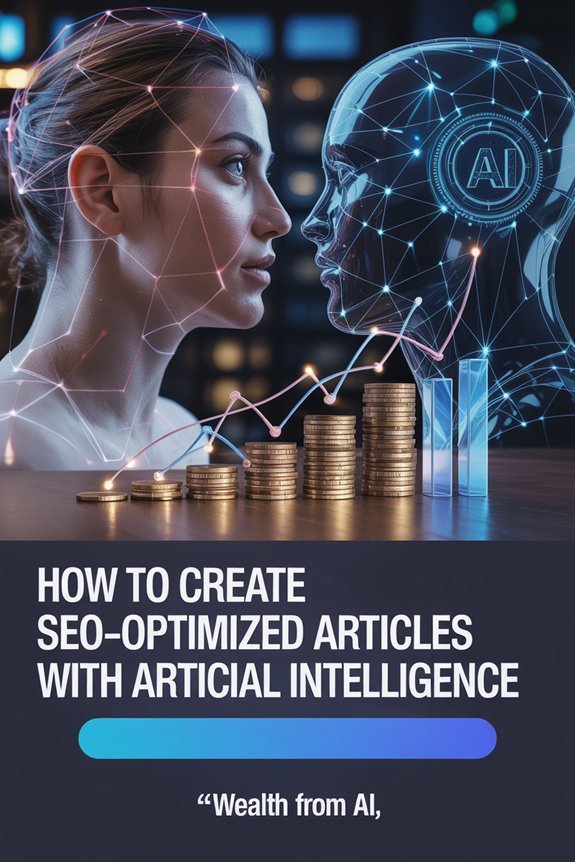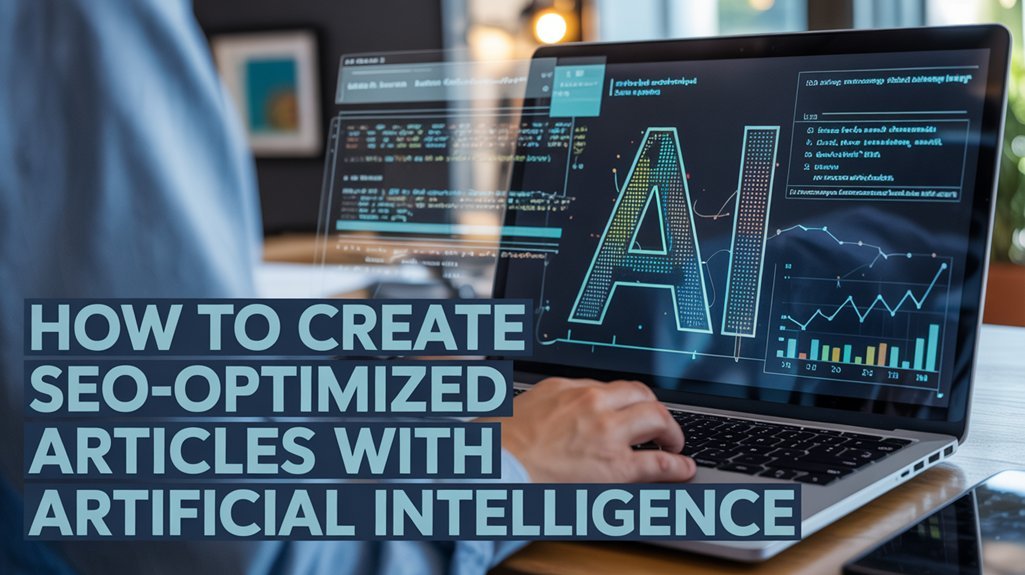
You'll create SEO-optimized articles with AI by crafting strategic prompts that specify your target keywords, format, and search intent—whether informational, navigational, or transactional. Use AI tools that provide real-time SEO analysis and generate metadata automatically, reducing writing time by up to 500% while maintaining quality across multiple languages. However, you must combine these tools with human editorial oversight to add unique insights and refine accuracy, as search engines prioritize expertise and engagement signals. The complete strategy requires optimizing for both traditional algorithms and AI citation systems to maintain competitive rankings.
Key Takeaways
- Use AI content generation tools with strategic prompts specifying format, tone, and target keywords aligned with user search intent.
- Leverage integrated SEO tools for real-time keyword density feedback, automatic metadata generation, and content optimization recommendations.
- Combine AI efficiency with human editorial oversight to add unique insights, verify accuracy, and enhance engagement quality.
- Implement dual optimization strategy addressing both traditional search algorithms and AI citation systems through technical SEO foundations.
- Monitor content performance with real-time SEO tracking tools that provide instant alerts for ranking changes and identify traffic-driving keywords.
Understanding AI-Powered Content Generation Tools and Their Capabilities
AI-powered content generation tools have revolutionized digital marketing by cutting writing time by up to 500% while maintaining quality standards.
You'll access advanced algorithms that produce high quality, SEO-optimized articles across 48 languages, giving you unprecedented reach and efficiency.
These AI writing tools deliver strategic advantages through integrated SEO tools that provide real-time improvement recommendations.
You'll receive immediate feedback on keyword research and placement, ensuring your content generation process yields maximum search visibility.
The platforms analyze content refinement requirements automatically, positioning your articles to dominate search rankings.
You're equipped to utilize bulk creation capabilities—generating up to 100 articles simultaneously while maintaining consistent quality.
Each piece incorporates automatic image generation that boosts visual impact without additional effort.
The AI-powered tools simplify your workflow by combining content creation, SEO content enhancement, and visual elements into one powerful system.
You'll improve your content faster and more effectively than traditional methods allow.
By implementing AI content optimization techniques, you can systematically enhance your content's search engine performance through data-driven improvements.
Developing Effective Prompts and Search Intent Alignment
You'll achieve better AI-generated content by crafting strategic prompts that specify format, tone, and target keywords while directly addressing user search intent.
Research shows that aligning your prompts with the three primary search intent types—informational, navigational, and transactional—increases content relevance by up to 73% in search rankings.
Your prompt engineering should incorporate specific user queries and pain points identified through keyword research tools to guarantee the AI produces content that matches what searchers actually need.
Clustering related keywords through AI enables you to identify semantic relationships and organize your content structure around topic groups that search engines recognize as comprehensive coverage.
Crafting Strategic AI Prompts
When you craft strategic AI prompts, you directly control the quality and relevance of your SEO content output. Clear, specific language targeting valuable keywords guarantees AI tools generate more accurate content aligned with search intent.
You'll enhance content by incorporating context and examples that reflect user needs precisely. Leverage data from top-performing articles to structure prompts that replicate successful strategies. This approach changes content creation from guesswork into calculated execution.
Include target keywords, specify desired tone, and define exact outcomes within each prompt. Monitor performance metrics relentlessly. Refine your prompts based on ranking data and engagement signals.
Each iteration sharpens your AI's understanding of what drives SEO outcomes. You're not just creating content—you're engineering search visibility through strategic prompt architecture that dominates competitive landscapes. Continuously optimize and refine your prompts to master the art of extracting maximum value from AI-generated content.
Matching User Search Intent
Strategic prompts mean nothing if they don't align with what users actually search for. You'll achieve superior rankings by matching AI-generated content precisely to user search intent. Utilize AI tools to analyze search trends and identify long-tail keywords that capture specific queries—70% of searches use three or more words, directly impacting conversion rates.
| Intent Type | Optimization Strategy |
|---|---|
| Informational | Address “how-to” queries with thorough answers |
| Navigational | Target brand-specific terms and product names |
| Transactional | Include comparison terms and purchase-focused content |
| Commercial | Feature review-oriented and evaluation keywords |
| Local | Incorporate location-based search patterns |
Deploy Google's “People also ask” for audience targeting insights. Combining AI writing with SEO optimization ensures your content strategy addresses both algorithmic requirements and human readability standards. Your SEO tasks must evolve with behavior shifts—continuously refine prompts for optimizing content that dominates search results and converts traffic into tangible outcomes.
Leveraging SEO Optimization Features for Keyword Integration
Modern AI-powered SEO tools convert keyword integration from guesswork into data-driven strategy by analyzing your content in real-time and suggesting optimization opportunities that boost search rankings.
These platforms utilize natural language processing to assess keyword density, preventing over-optimization while maintaining search engine compliance. You'll receive immediate feedback on content optimization, enabling strategic adjustments that align with user intent and current search trends.
AI-powered platforms prevent keyword stuffing through real-time density analysis, delivering instant optimization feedback aligned with search intent and compliance standards.
AI tools automatically generate metadata—title tags and meta descriptions—calibrated to user behavior patterns, maximizing your visibility in organic search results.
The semantic analysis capabilities identify relevant secondary keywords you've overlooked, expanding your content's reach without diluting its focus. This automation eliminates manual keyword research inefficiencies while ensuring your articles maintain authoritative quality.
Implementing Real-Time Content Analysis and Performance Monitoring
You'll enhance your content's search performance by implementing real-time SEO tracking tools that monitor rankings, backlinks, and organic traffic as they fluctuate.
These platforms provide instant alerts when your articles experience ranking changes or technical issues, enabling you to respond immediately rather than discovering problems weeks later through manual checks.
Real-Time SEO Tracking Tools
While traditional SEO tools provide periodic snapshots of your website's performance, real-time tracking platforms deliver continuous monitoring that captures every ranking fluctuation, traffic spike, and user interaction as it happens.
These real-time SEO tracking tools utilize AI algorithms to analyze user behavior patterns, converting raw data into actionable intelligence for your optimization efforts.
You'll gain competitive advantage through continuous keyword tracking and SERP monitoring that identifies ranking shifts before competitors react.
AI-powered content analysis evaluates content effectiveness instantly, recommending strategic adjustments that boost engagement and visibility.
Automated alerts notify you of critical performance changes, enabling immediate response to potential issues.
As an SEO expert, you'll employ these platforms to execute data-driven decisions with precision, maintaining dominant search positions through proactive strategy adjustments rather than reactive troubleshooting.
Content Performance Metrics Analysis
When content goes live, AI-powered analytics platforms begin tracking critical performance indicators that determine search visibility and user engagement success.
Your AI Content Writer integrates flawlessly with performance monitoring tools to deliver practical insights through AI-driven analytics. You'll identify which keywords drive traffic, where content gaps exist, and how user behavior patterns affect SEO rankings.
Strategic content optimization requires monitoring these metrics:
- Engagement patterns: Track bounce rates, time-on-page, and conversion triggers to refine content strategy
- Keyword performance: Assess which phrases attract qualified traffic and improve search visibility
- Content effectiveness: Identify gaps and improvement opportunities through continuous evaluation
Real-time feedback enables 500% efficiency gains, allowing immediate iterations based on data.
You'll make power-driven decisions that boost your content's competitive advantage and market dominance.
Balancing AI Automation With Human Editorial Oversight
AI tools can slash your content creation time by up to 500%, but they'll deliver subpar results without human editorial oversight. Your AI-generated drafts need substantial editing to inject unique insights and personal expertise that search engines now demand.
Deploy AI for SEO strategically by pairing content tools like Surfer SEO and Frase with rigorous human input. This combination lets you enhance content in real-time while maintaining the authenticity that drives search results performance.
Search engine updates increasingly penalize generic AI output, rewarding high-quality content that demonstrates genuine expertise. Your editorial oversight must focus on refining accuracy, enhancing engagement, and improving user experience.
This reduces bounce rates and signals quality to search algorithms. The content tool handles data analysis and keyword enhancement; you provide the strategic thinking and industry knowledge that establishes authority.
This balanced approach delivers SEO-optimized articles that dominate search results while building sustained trust with your audience.
Optimizing for Both Traditional Search Engines and AI Citations
Your human-AI partnership extends beyond content creation into a dual-enhancement strategy that targets both traditional search algorithms and emerging AI citation systems. This approach revolutionizes your SEO game by addressing how both conventional search and AI search platforms evaluate your web pages.
Modern SEO demands dual optimization: satisfy traditional search algorithms while positioning content as citation-worthy material for AI systems.
Implement these strategic elements to dominate both channels:
- Technical SEO foundations – Enhance meta tags, schema markup, and site architecture while ensuring AI tools can parse your content structure efficiently.
- Citation-worthy authority signals – Build credible link building networks and demonstrate expertise that AI systems recognize as trustworthy source material.
- Strategic content marketing architecture – Structure information hierarchically with data-rich insights that satisfy traditional ranking factors while providing citation-ready answers for AI platforms.
Your content must simultaneously satisfy Google's crawlers and ChatGPT's training parameters. Deploy AI tools to analyze keyword density, monitor technical SEO metrics, and identify gaps where competitors fail to bridge traditional-AI enhancement divides.
Frequently Asked Questions
How to Write SEO Optimized Content With AI?
Start by leveraging AI tools for thorough keyword research and audience analysis to identify high-impact opportunities.
Structure your AI content with strategic meta tags, alt text, and enhanced headings that boost crawlability.
Monitor your readability score in real-time while ensuring content freshness through data-driven updates.
Track engagement metrics consistently to refine your approach.
You'll dominate search rankings by combining AI-powered content structure with continuous performance analysis, giving you the competitive edge you need.
Can AI Do SEO Optimization?
Yes, you'll utilize AI's powerful SEO capabilities to dominate search rankings.
AI-driven SEO tools excel at keyword analysis, decoding user intent, and optimizing critical ranking factors. You're equipped to generate meta descriptions, execute strategic content optimization, and adapt swiftly to algorithm updates through data-driven insights.
AI converts content generation from guesswork into precision targeting, giving you competitive advantage through automated analysis and implementation.
You'll outmaneuver competitors by employing AI's systematic approach to SEO mastery.
Can Chatgpt Write SEO Articles?
Yes, you'll utilize ChatGPT's AI writing capabilities to dominate search rankings.
It performs thorough keyword research, maintains ideal content length, and delivers superior readability scores.
You're getting strategic topic relevance with precise audience targeting and tone adjustment tailored to your specifications.
The system guarantees content quality through data-driven optimization while you conduct plagiarism checking to maintain originality.
Coincidentally, what once required extensive resources now becomes your competitive advantage—you'll produce SEO-optimized articles that outrank competitors efficiently.
How to Automate SEO With AI?
You'll automate SEO with AI by deploying AI tools for rapid keyword analysis and competitor research that identifies gaps in your market dominance.
Utilize automated reporting and performance tracking to monitor rankings continuously.
Use AI-powered SEO audits to enhance content structure based on user intent while identifying emerging trends before competitors.
Implement strategic automation for metadata generation, link prospecting, and real-time analytics—transforming weeks of manual work into data-driven decisions that scale your search visibility exponentially.
Conclusion
You've now revealed the blueprint for AI-powered content that ranks. By mastering prompt engineering, aligning with search intent, and weaving keywords strategically throughout your content, you're building a bridge between human creativity and machine efficiency. Don't let AI run on autopilot—combine real-time analytics with editorial precision to maintain quality standards. As search algorithms evolve toward AI-generated citations, you'll stay ahead by optimizing for both traditional SERPs and emerging discovery platforms. Your competitive edge depends on this hybrid approach.

